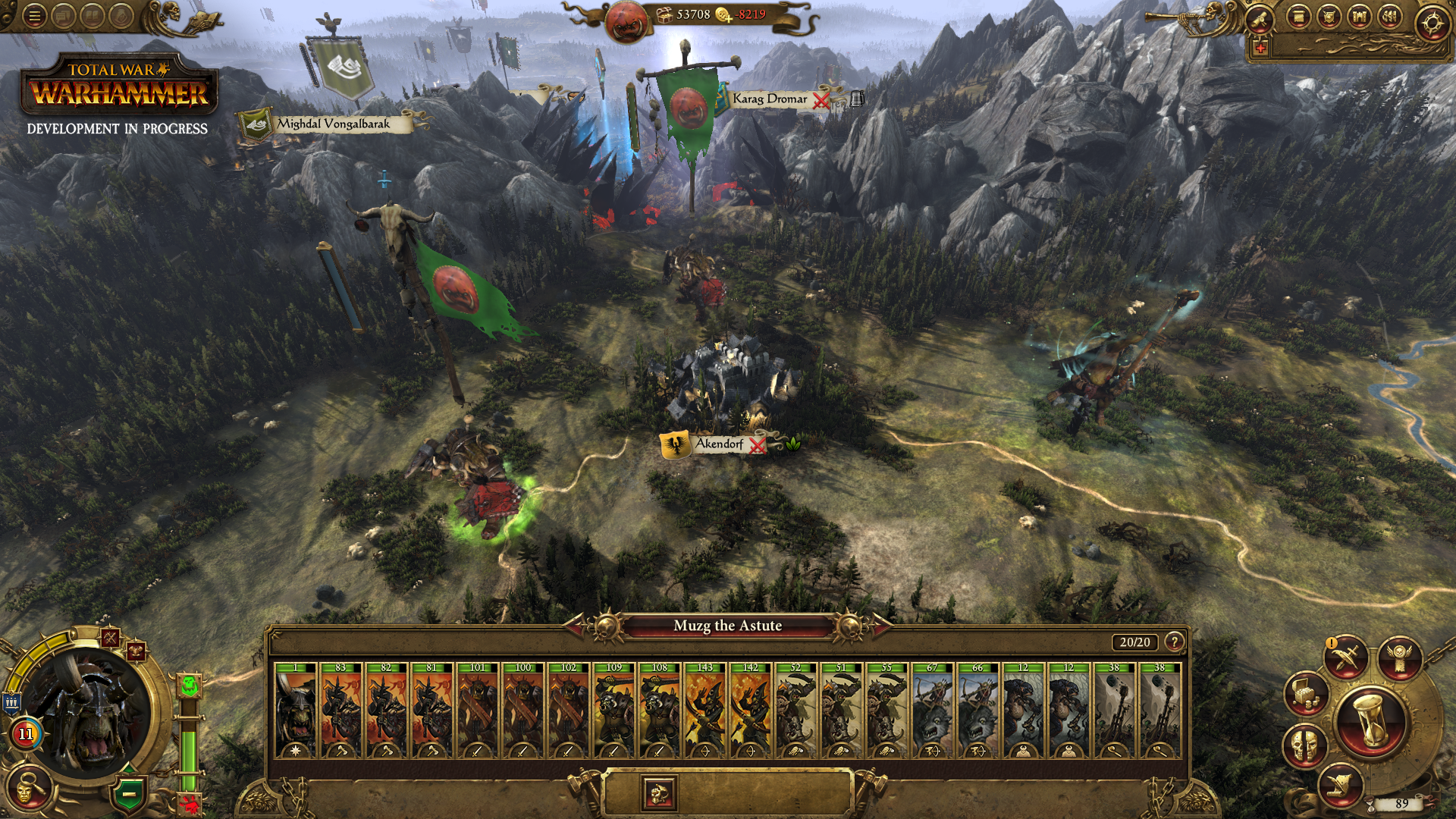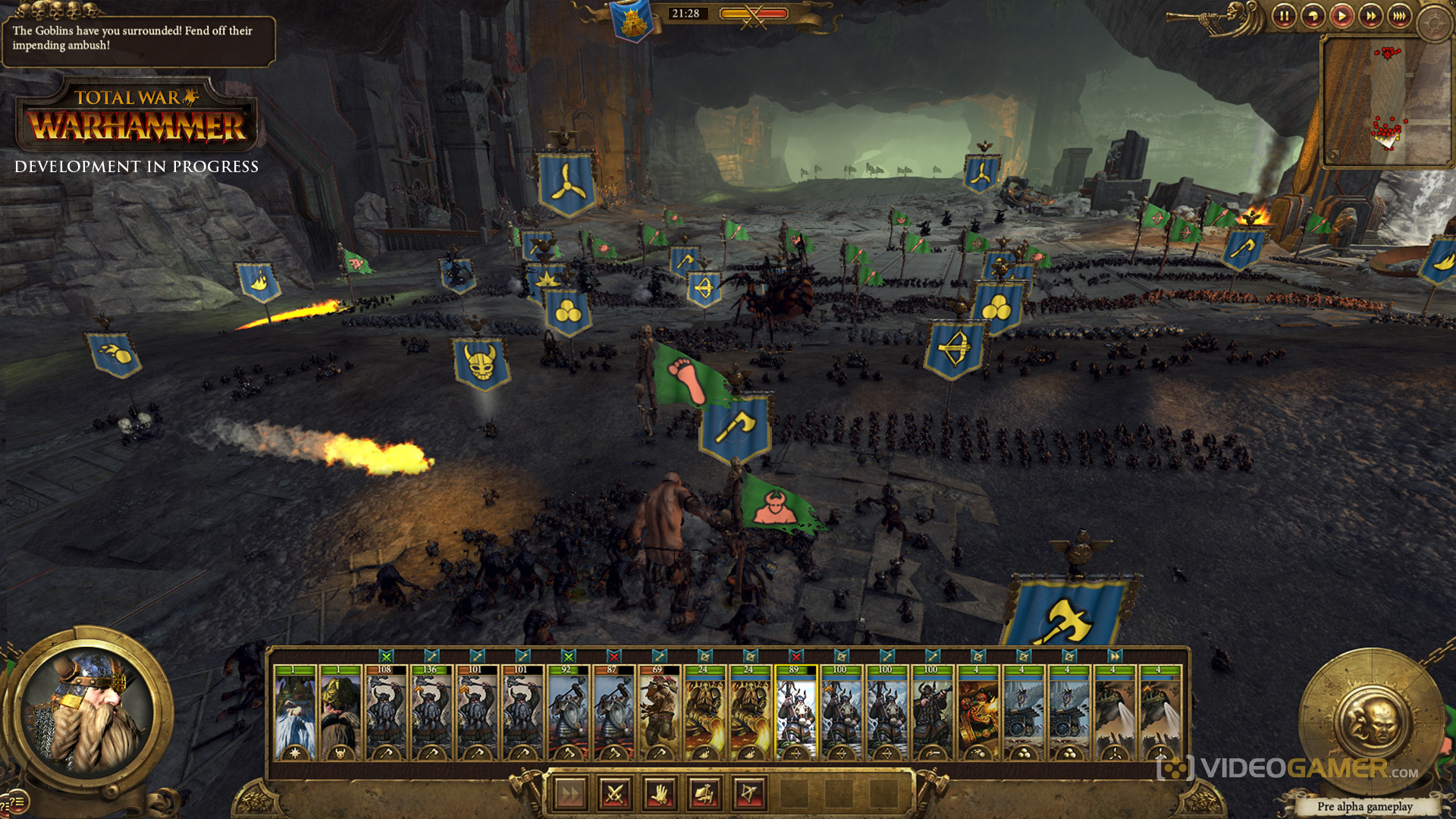Platform:
PC
Released:
May 24, 2016
Publisher:
Sega
Developer:
Creative Assembly
Total War: Warhammer is probably the best that the Total War series has ever been. Replacing traditional historical elements with the fantastical setting of the Warhammer universe has breathed new life into a series that has struggled with innovation in recent years. While existing fans of the series surely won’t be disappointed by this game, it may have limited appeal to a broader audience. Although combining turn-based strategy with real time tactical battles offers good variety, the game doesn’t seem to excel greatly in either format, leaving its position in the market unclear.
There are four factions to choose from in the campaign mode: The Dwarves, The Empire of Man, The Greenskins and The Vampire Counts. There is a fifth faction available in a paid DLC (Chaos Warriors). For each faction you can pick from one of two emperors to lead your faction to glory – if you’re familiar with the Warhammer franchise you may even recognise some of them from previous scenarios. As one would expect, each faction comes with their own strengths and weaknesses: for example, the Vampire Counts don’t have access to any ranged units, but as an upside have the ability to raise units from the dead during and after battle, meaning they excel at raising armies quickly.
Total War: Warhammer offers a good learning experience for new players. You are given good directions on how you should go about building your empire without being force-fed the strategy entirely. There are many aspects to this side of the game, and the fact that there are so many different levers you can pull at any one time forces you to really think about your moves. Armies can be raised fairly quickly, especially if you have already captured multiple settlements. However the more armies you make, the more your upkeep will cost. You can choose to raise taxes to support your war campaign, but then public order will suffer. It’s a delicate balancing act, but definitely gives you the sense of being in the emperor’s shoes.
“It’s a delicate balancing act, but definitely gives you the sense of being in the emperor’s shoes.”
Your armies have various stances they can take while marching which offer different benefits. When walking through enemy territory you can choose to raid as you go, which delivers gold back to the treasury and harms your enemies. As an alternative, if you’re sneaky enough, you can set up for an ambush on an enemy army, which will give you bonuses on the battlefield. Similarly, when you go to take a settlement, you can choose to siege immediately or you can encircle and starve them out. If you can afford to wait a few turns as their supplies run out, it will make for a much easier fight later on. And while day-to-day conquest keeps you busy, there are also occasional calls to action where you have to complete a specific quest within a few turns: having to reallocate your resources to do so ensures that the game remains dynamic and keeps you on your toes.
While there’s enough strategic elements to keep you busy, this side of the game does seem to lack a bit of personality. There aren’t multiple win conditions available to you: you generally just have to eliminate the other factions or capture or raze a certain amount of settlements.The diplomacy falls a little flat too: you don’t really get a sense of the history or the relationships between different leaders and instead the conversations seem purely transactional. Some funny quotes and interesting political choices do pop up occasionally, but not enough to break what feels like blandness at times. There isn’t much to the resource and trading system either, and strategic land grabbing isn’t really a feature of this game because no one bit of land seems more important than another. Additionally, be warned that before you start a multiplayer match, make sure you’ve got something to do in between turns because players can’t make their moves simultaneously, unlike similar games such as Civilization.
You can play out some epic battles on the warfare side of the game. The settings are absolutely incredible: whether you’re sieging a castle or fighting in massive caves underground, you’ll get a huge adrenaline rush from sending your army into battle. This is particularly so in Warhammer due to some of the magical units that you can employ against your enemy, such as the Varghulf, which can only be described as a towering mass of muscle, teeth and claws created for the sole purpose of tearing through foes. Flying units are also available for the first time in a Total War game, an exciting addition.
The main problem with the tactical warfare is that it requires an extreme level of micromanagement to do well. You have to individually look after 20 unit groups in this midst of battle, trying to take in their health, fatigue levels, whether they’re winning their current skirmish or whether they’re demoralised. This is on top of the fact that your leader has a seemingly endless array of spells that can be cast at any one time. You could have also any number of special units with their own abilities that require your attention. This level of micro would be understandable if this were just a warfare game, but you’re only dipping into battle every now and again. This means that rather than putting up with the stress of combat, it becomes easier to auto-resolve battles rather than fighting them out. However, one cool feature of multiplayer is that you can gift your units to a friend, which reduces the pressure and adds a fun sense of comradery.
Positive:
- Highly strategic gameplay
- Exhilarating, large-scale battles
- Multiplayer options
Negative:
- Tactical battles require lots of micro-management
- Dull at times
- Currently not that many factions to choose from
The problem is that if players decide that it’s not worthwhile playing out many battles, what you’re left with is a good, but not great turn-based strategy game. Despite this, there is a lot to like about what Creative Assembly and Sega have put together here. Both the strategy and warfare aspects of the game are challenging and enjoyable in their own right and the multiplayer mode is fun, if not perfectly optimised. Long-time Total War fans will find this an excellent addition to the franchise, but this game can also be recommended to anyone who just wants to add something new to their strategy library.








